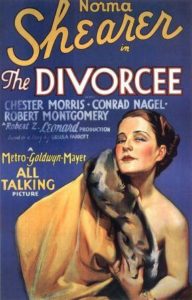A Metro-Goldwyn-Mayer All Talking Picture!
Surprisingly, with that tagline, The Divorcee is a film I only fell asleep through twice- and that’s a bit of a sham. In a never-ending quest to bring new stars into our fold, I had a mission of sorts to bring insightful commentary (or at least my best imitation thereof) on a Norma Shearer film to the fore.
There’s a reason that some films induce slumber, though only a few of those are the cause of the film itself- though there is a certain Ann Sheridan film that defies me to this day, though Vertigo was also problematic in the same way.
Though there is a hair of over-enunciating here, there is nothing here that compares to most of the early talkies which featured tons of the above and often stiff body movements so as not to impact the sound of any related dialogue.
Better still, the film holds up and doesn’t feel dated in the slightest (outside of the women’s fashions). Norma Shearer, the headliner here, is Jerry, a young and appropriately impressionable young woman. She’s fallen head over heels for Chester Morris’ Ted, and after he proposes at a lodge upstate during a getaway with their friends, they are married.
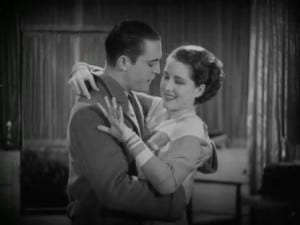 In the background we realized that this marriage puts her friend Paul (Conrad Nagel) in an odd place, as he’s obviously been silently (or not so) pining away for Jerry’s attention and affection. Drowning his disappointment at loosing her, he has a few too many before they all depart. Insisting on driving, he overturns his car, cruelly disfiguring Dorothy’s face traumatically in the process.
In the background we realized that this marriage puts her friend Paul (Conrad Nagel) in an odd place, as he’s obviously been silently (or not so) pining away for Jerry’s attention and affection. Drowning his disappointment at loosing her, he has a few too many before they all depart. Insisting on driving, he overturns his car, cruelly disfiguring Dorothy’s face traumatically in the process.
Jerry and Ted’s opulent ceremony attended by hundreds in a massive church is immediately juxtaposed with Paul and Dorothy’s, which takes place at her bedside in the hospital, with her face wrapped rather severely in bandages and his arm in a sling. Though not stated explicitly, we presume Paul’s taken the plunge out of guilt.
Next thing we know we are celebrating Jerry and Ted’s third anniversary, with Ted presenting her with a fabulous ring prior to a party to celebrate their sacred day. During the party, immediately after which Ted has to leave on a business trip, it Jerry learns that he’s had a drunken fling with one of the partygoers.
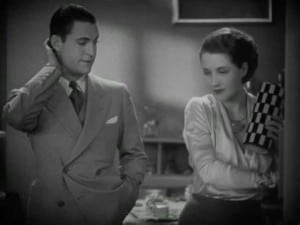 Though Jerry shrugs it off on the outside we can see that she’s perturbed to say the least. Shearer is exemplary throughout the picture in showcasing her emotions without being over the top as many of her contemporaries would have been. Here her emotions go to adorabley loving to merely tepid, and it is clear she is contemplating her next step as Ted leaves, saying merely, “It didn’t mean anything.”
Though Jerry shrugs it off on the outside we can see that she’s perturbed to say the least. Shearer is exemplary throughout the picture in showcasing her emotions without being over the top as many of her contemporaries would have been. Here her emotions go to adorabley loving to merely tepid, and it is clear she is contemplating her next step as Ted leaves, saying merely, “It didn’t mean anything.”
Jerry’s resolve stiffens while Ted is away and she has her own fling with the still smitten Paul. Ted’s cables and calls while he is away are not answered and finally she breaks things off with him on his return and they are divorced.
Divorced the couple each go their own way, with Ted heading to Paris, where he hops from job to job while increasingly drunker. As the picture is told from Jerry’s perspective, we hear of his fall primarily to the recountings of others.
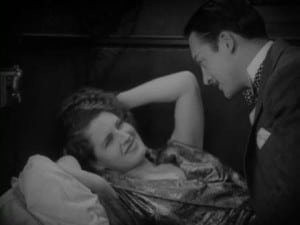 Jerry, on the other hand, makes men her drug of choice, at one point lamenting, “I’ve become such a whore.” As she’s about to engage in another tryst she encounters Paul, with whom she’s lost touch. He intervenes and show her would be suitor the door.
Jerry, on the other hand, makes men her drug of choice, at one point lamenting, “I’ve become such a whore.” As she’s about to engage in another tryst she encounters Paul, with whom she’s lost touch. He intervenes and show her would be suitor the door.
Paul reenters Jerry’s life in a big way, to the point that they are going to marry. It is only on the climactic day where Paul informs Dorothy of his desire to divorce to marry her that Jerry puts her foot down, noting candidly that Dorothy chose to fight for her marriage when it hit a snag, while she herself had merely quit and walked away.
Filled with this newfound self assurance, she flees to Paris in search of Ted. After a brief discussion, he warms immediately to a reconcilliation.
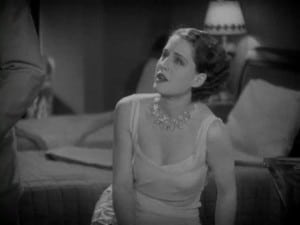 With excellent pacing and a wonderful performance by Norma Shearer, it’s difficult to discount the effectiveness of The Divorcee. Without a doubt the movie is a surprise with its compelling narrative which still plays well today.
With excellent pacing and a wonderful performance by Norma Shearer, it’s difficult to discount the effectiveness of The Divorcee. Without a doubt the movie is a surprise with its compelling narrative which still plays well today.
Shearer’s performance, which earned her her only Academy Award, ebbs and flows with her character. Early on she’s clearly young and naive, becoming overwhelmed with emotion for Ted.
As she learns of his betrayal we can see disillusionment and confusion cloud her eyes, only to be replaced with steely resolve as she readies to “balance her account.” Later still we see her trying to be the carefree girl she once was, and superficially succeeding as she dallies with man after man. Yet we can see that here happiness is only skin deep and her smiles lack the deep warmth exhibited in the early reels with Ted. Those warm smiles return only in the final scene as they decide to reconcile.
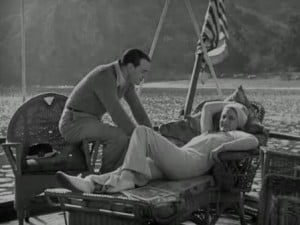 For the rest of the cast, Chester Morris is strong if perhaps slightly overly severe as Ted. Even in the best of he seems ornery and on edge, but retains the complete believability of the character.
For the rest of the cast, Chester Morris is strong if perhaps slightly overly severe as Ted. Even in the best of he seems ornery and on edge, but retains the complete believability of the character.
Conrad Nagel as Paul is good as well, though comes off a bit as a damp dishrag through primarily little character development- though again perhaps that is his purpose. Though easy to see why Jerry finds herself unable to stay with Paul in the long term, it is equally unfathomable what- even as an outlet for her matrimonial rage- could be found attractive in the unlovable Paul.
Suffice to say you’ll find The Divorcee well worth the time.
